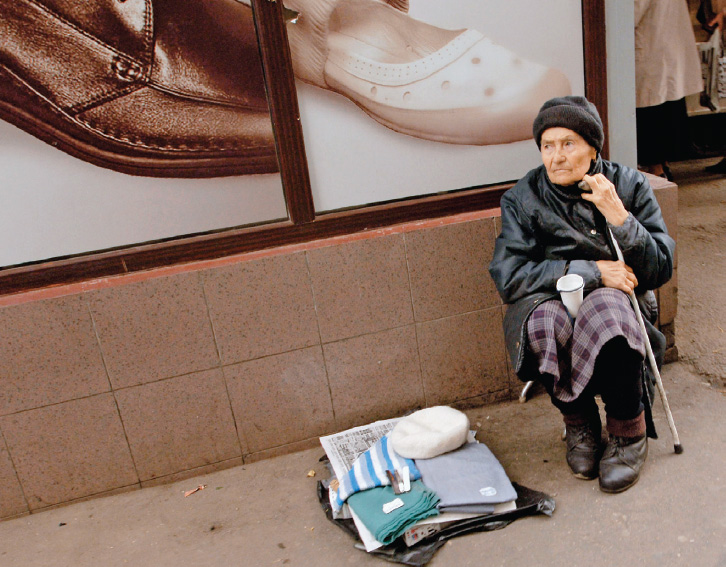A History of Western Society: Printed Page 1008
A History of Western Society, Value Edition: Printed Page 1019
Economic Shock Therapy in Russia
Politics and economics were closely intertwined in Russia after the dissolution of the Soviet Union (see “The Disintegration of the Soviet Union” in Chapter 29). President Boris Yeltsin (r. 1991–1999), his democratic supporters, and his economic ministers wanted to create conditions that would prevent a return to communism and right the faltering economy. Following the example of Poland (see “The Collapse of Communism in the East Bloc” in Chapter 29), and agreeing with neoliberal Western advisers who argued that a quick turn to free markets would speed economic growth, Russian reformers opted in January 1992 for liberalization at breakneck speed.
To implement the plan, the Russians abolished price controls on 90 percent of all Russian goods, with the exception of bread, vodka, oil, and public transportation. The government also launched rapid privatization — the sale of formerly state-owned industries and agricultural concerns to private investors; as a result, thousands of factories and mines were turned over to new private companies. In an attempt to share the wealth privatization was expected to generate, each citizen received a voucher worth 10,000 rubles (about $22) to buy stock in these private companies, but ownership usually remained in the hands of the old bosses — the managers and government officials from the Communist era — undermining the reformers’ goal of worker ownership.
President Yeltsin and his economic reformers believed that shock therapy would revive production and bring widespread prosperity. The results were quite different. Prices increased 250 percent on the very first day and kept on soaring, increasing by a factor of twenty-six in the course of 1992. At the same time, production fell a staggering 20 percent. Nor did the situation stabilize quickly. After 1995 inflation still raged, though at slower rates, and output continued to fall. According to most estimates, Russia produced from one-third to one-half less in 1996 than it had in 1991. The Russian economy crashed again in 1998 in the wake of Asia’s financial crisis.
Rapid economic liberalization worked poorly in Russia for several reasons. Soviet industry had been highly monopolized and strongly tilted toward military goods. Production of many items had been concentrated in one or two gigantic factories or in interconnected combines. With privatization, these powerful state monopolies became powerful private monopolies that cut production and raised prices in order to maximize profits. Moreover, powerful corporate managers and bureaucrats forced Yeltsin’s government to hand out enormous subsidies to reinforce faltering firms and to avoid bankruptcies. New corporate leaders included criminals who intimidated would-be rivals in attempts to prevent the formation of competing businesses.

Runaway inflation and poorly executed privatization brought a profound social revolution to Russia. The new capitalist elite — the so-called Oligarchs — acquired great wealth and power, while large numbers of people fell into abject poverty and the majority struggled to make ends meet. Managers, former Communist officials, and financiers who came out of the privatization process with large shares of the old state monopolies stood at the top. The new elite held more wealth than ever before, and the Oligarchs maintained control with corrupt business practices and rampant cronyism. By 1996 Moscow, with 5 percent of Russia’s population, controlled 80 percent of its capital. At the other extreme, the vast majority of people saw their savings become practically worthless. Pensions lost much of their value, and many people sold their personal goods to survive. A telling indicator of the hardship caused by the collapse of the Soviet welfare state and growing poverty was the catastrophic decline in the life expectancy of the average Russian male from sixty-nine years in 1991 to only fifty-eight years in 1996. Under these conditions, effective representative government failed to develop, and many Russians came to equate democracy with the corruption, poverty, and national decline they experienced throughout the 1990s. Yeltsin became increasingly unpopular; only the support of the Oligarchs kept him in power.